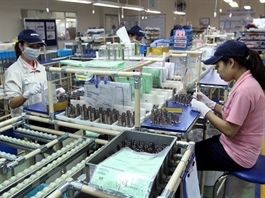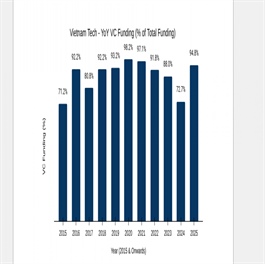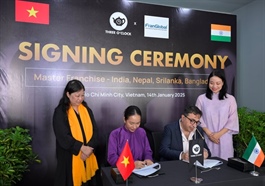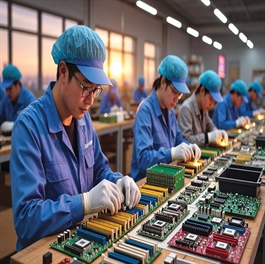FDI drives Vietnam towards industrialisation and modernisation
FDI drives Vietnam towards industrialisation and modernisation
Tran Toan Thang, head of International Studies and Integration Policy under the National Institute for Economics and Finance, highlights how foreign capital and advanced technologies are accelerating industrial growth.
Industrialisation is a prerequisite for developing a modern industrial sector. How has Vietnam pursued industrialisation since the beginning of the doi moi (reform) process?

Tran Toan Thang |
Industrialisation is considered a fundamental path for Vietnam to become a developed, high-income country. The country began pursuing industrialisation even before the doi moi era, with a strong focus on developing heavy industries.
After 1986, and especially from 2001 onwards, as Vietnam deepened its integration into the global economy, the country made significant strides in industrialisation. However, it has yet to fully meet the core objective of becoming an industrialised nation by 2020.
In this new era, the orientation for industrialisation has been clearly laid out in Resolution No. 29-NQ/TW dated November 2022. The resolution outlines the country's goals and strategic perspectives for industrialisation and modernisation through 2030 with a vision to 2045.
It will also form the basis for the draft documents of the 14th National Party Congress scheduled to be held in early 2026. The documents will focus on a fundamental and comprehensive transformation of the economy and society, driven mainly by the development of industry and services, and underpinned by science, technology, and innovation.
Despite substantial economic growth and progress in industrialisation, do you believe that foreign direct investment (FDI) remains essential for accelerating this process?
In 2019, the Politburo issued Resolution No. 50-NQ/TW, which provides strategic guidance for improving institutions and policies and enhancing the quality and efficiency of foreign investment cooperation through 2030.
The resolution acknowledges the increasingly dynamic landscape of foreign investment, with numerous multinational corporations and major enterprises bringing advanced technologies to Vietnam.
These investments have increased in both scale and quality, contributing significantly to job creation, income generation, improved production capacity, and economic restructuring, thus driving innovation in growth models.
After six years of implementing Resolution 50-NQ/TW, the Ministry of Finance has tasked the National Institute for Economics and Finance with conducting a preliminary assessment of the FDI sector's contribution to Vietnam's industrialisation. Our findings show a notably positive shift in FDI trends.
Between 2010 and 2024, there was a marked transition from labour-intensive sectors to high-tech industries.
The share of FDI in the electronics sector rose from 4.1 per cent in 2010 to 17.8 per cent in 2024. Moreover, FDI has been increasingly concentrated in the manufacturing and processing industries, which form the backbone of industrialisation.
In 2024, the manufacturing and processing sector attracted a total of $24.68 billion in foreign capital flow (both new and additional capital), accounting for 73.3 per cent of total FDI volume. Realised capital reached $20.62 billion, or 81.4 per cent of the total.
In the first seven months of 2025, the sector attracted $12.12 billion, representing 60.6 per cent of total newly registered and additional capital, with realised capital reaching $11.1 billion, equal to 81.6 per cent of the total.
These figures highlight that, to accelerate industrialisation and meet the 2030 goal of becoming a modern-oriented country with robust industrial development, Vietnam must continue to rely on the resources provided by the FDI sector.
Private businesses are expanding, and there are shifts in FDI flows in light of the US implementing adaptive tariff policies. What is your assessment of these developments?
Resolution No. 68-NQ/TW on private economic development affirms that the private sector is the most critical driving force of the national economy, contributing significantly to growth, employment, and innovation.
This is a correct and necessary viewpoint, as no economy can develop without self-reliance and autonomy.
That said, globally, no country, whether the United States, China, Japan, the EU, or Singapore, has ever rejected the importance of FDI. In fact, nearly all countries implement mechanisms and incentives to attract foreign investment.
For economies undergoing industrialisation like Vietnam, FDI is even more vital.
It must be emphasised that over the past four decades, the FDI sector has played an essential role in Vietnam's economic and social development.
FDI brings not only financial capital but also cutting-edge technologies, managerial expertise, job opportunities, and expanded export markets, gradually integrating Vietnam more deeply into global value chains.
Vietnam is increasingly becoming a key destination for investors within ASEAN. Even during periods when global capital flows are under pressure, FDI inflows to Vietnam have remained relatively strong.
For example, in 2023, despite a global FDI decline of approximately 10 per cent, Vietnam achieved a record $36 billion in registered capital and $25.5 billion in disbursed FDI, up 32 per cent and 3.5 per cent on-year, respectively.
- 17:13 21/08/2025



























